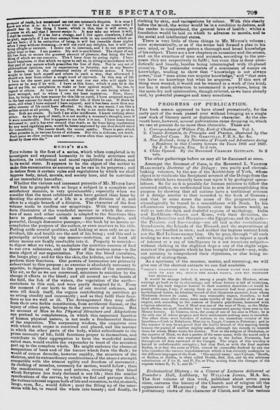111U DIE'S If •N.
Tills volume is the first of a series, which when completed is to investigate and expound humanity in its bodily structure and functions, its intellectual and moral capabilities and duties, and in its social state. It appears to be the object of the author to cake this examination as amusing as he can in its progress ; and to deduce from it certain rules and regulations by which we shall improve body, mind, morals, and society here, and be convinced of our immortality hereafter.
Whether the various Ind incessant pursuits of Mr. Mums have fitted him to grapple with so large a subject in a complete and satisfactory manner, is very questionable ; especially when we consider that the most celebrated men have gained their fame by devoting the attention of a life to a single division of it, and often to a single branch of a division. The character of the first volume tends to confirm our misgivings. With many curious facts illustrative of the wonderful manner in which the struc- ture of man and other animals is adapted to the functions they have to perform,—and with some ingenious thoughts, and powerful, though discursive passages,—the book by no means ac- complishes the purpose of the author, or even answers to his title. Putting aside mental qualities, and looking at man only as an in- dividual, life and health are the end of his being ; and this end is principally achieved by one means—nutrition, or at least all other means are finally resolvable into it. Properly to nourish— to digest what we take, to assimilate the nutritive essence of food to our own substance, and to throw oft the useless mass—is the main object of our organization. For this the blood circulates, the lungs play; and for this the skin,the kidnies, and the bowels, perform their functions. Our powers of locomotion are primarily subservient to this purpose; as exercise is absolutely necessary to appetite, to digestion, and to the proper action of the secretions. The air, so far as we are concerned, ministers to nutrition by the change it effects in the blood; and all around us—the beasts of the field, the fish of the waters, the vegetation of the earth— contribute to this end, and were partly designed for it. From the moment of our birth to that of our mortal sickness, and even till death itself, the organs contributing to nutrition go on acting steadily and incessantly ; and as they fulfil their func- tions so are we well or ill. The derangement they may suffer from their own feeble constitution, from accidental disease, or the Injury of other parts, belongs to the province of medicine. But no account of Man in his Physical Structure and Adaptations can pretend to completeness, in which this important function of human physical nature, is not made a fundamental feature of the exposition. The surpassing wisdom, the exquisite care with which each organ is contrived and placed, and the manner in which the other parts of the body, whilst subordinate to the prime necessity of life, fulfil functions proper to themselves, arid contribute in their aggregation to form the wonderful animal called man, would enable the expounder to treat of the minutest part up to the complete whole. He might embrace the chemical composition of bone and of the tissues which form the flesh ; lie would of course describe, however rapidly, the structure of the skeleton, and its extraordinary combinations of the utmost strength compatible with the utmost agility and freedom of movement ; its clothing of muscles, necessary for motion, would follow ; then the ramifications of veins and arteries, circulating that blood Which Scripture has truly declared is our life ; then the similar ramifications of the nerves, by which we feel and perhaps think; the various internal organs both of life and sensation, as the stomach, lungs, e)es, &c., would follow; next the filling up of the inter- stices with fat, to round the whole into beauty ; and finally, its
clothing by skin, and variegations by colour. With this &early before the mind, the writer would be in a condition to deduce, and the reader to comprehend, the general laws of health ; whilst a foundation would he laid on which to advanoe to morals, and te the social and intellectual states.
There is very little of these things in Mr. MIIIHR'S volume; none systematically, or as if the writer had formed a plan in his own mind, or had even gotten a thorough and broad knowledge of his subject. There are a few chapters on sensation and the senses, and on the structure of man and animals, according to the pur- poses they are respectively to fulfil; but even this is done anec- dotically and loosely, besides being intermingled with ill-placed remar%s. The remainder consists of a succession of essays on knowledge, tending to show that "knowledge is not always power," that " man alone can acquire knowledge," and "that man can have no knowlege but what be acquires... If this sort of thing were wanted, it would not be wanted in a work of this kind; nor has it much attraction to recommend it anywhere, being in the main dry and opinionative, though relieved, as we have already said, by powerful passages and many anecdotes.


























 Previous page
Previous page